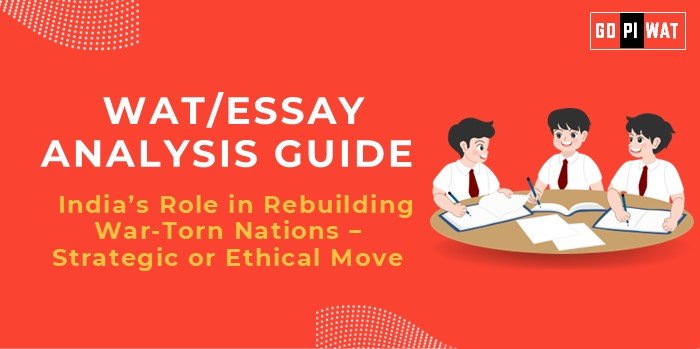📋 WAT/Essay Analysis Guide: India’s Role in Rebuilding War-Torn Nations – Strategic or Ethical Move?
🌐 Understanding the Topic’s Importance
India’s rebuilding efforts in war-torn nations highlight a crucial intersection of ethical leadership, strategic foresight, and international relations. For B-school aspirants, this topic provides valuable insights into balancing corporate and governance strategies with humanitarian objectives.
🕒 Effective Planning and Writing
- Planning: 5 minutes.
- Writing: 20 minutes.
- Review: 5 minutes.
Structure:
- Introduction: 60–70 words.
- Body: 350–375 words.
- Conclusion: 60–70 words.
📜 Introduction Techniques
- Contrast Approach: “While India’s rebuilding efforts reflect its ethos of Vasudhaiva Kutumbakam, strategic interests in countering regional influence and securing resources often shape its policies.”
- Solution-Based Approach: “India’s approach to post-conflict reconstruction demonstrates a blend of ethical commitments and strategic foresight, offering lessons for balancing humanitarianism with pragmatism.”
📊 Structuring the Essay Body
🏆 Achievements
- 💰 India’s $3 billion investment in Afghanistan includes schools, hospitals, and infrastructure, showcasing its humanitarian commitment.
- 🌍 Participation in 49 UN peacekeeping missions with over 200,000 troops reflects global leadership in conflict resolution.
⚠️ Challenges
- 🛡️ Security Risks: Repeated attacks on Indian missions, such as in Afghanistan, highlight operational vulnerabilities.
- 🌏 Strategic Criticism: Accusations of countering China’s influence, such as through aid to Sri Lanka, raise ethical concerns.
🚀 Future Outlook
- 🤝 Balance ethics and strategy through public-private partnerships involving Indian companies in rebuilding efforts.
- 🌐 Foster international cooperation to ensure transparency and mitigate geopolitical tensions.
✍️ Concluding Effectively
- Balanced Conclusion: “India’s contributions to rebuilding war-torn nations exemplify a dual commitment to ethical principles and strategic imperatives. However, achieving sustainable success will require a greater focus on inclusivity and collaboration.”
- Global Comparison Conclusion: “India can draw lessons from Norway’s peacebuilding model and China’s strategic investments to refine its approach, ensuring that ethical and pragmatic objectives align for long-term impact.”
📚 Sample Essays
Balanced Perspective:
“India’s post-conflict reconstruction efforts embody its ethical philosophy, yet strategic interests are an undeniable factor. The challenge lies in maintaining this balance to ensure credibility and global leadership.”
Solution-Oriented:
“India’s emphasis on infrastructure and humanitarian aid in Afghanistan highlights its ethical leadership. By fostering global partnerships and emphasizing inclusivity, India can further its influence while safeguarding its interests.”
Global Comparison:
“India’s efforts in Afghanistan contrast with China’s debt-driven policies under the Belt and Road Initiative. By combining ethical imperatives with strategic investments, India offers a viable model for sustainable rebuilding.”
🌟 Recommendations for Sustainable Progress
- 🤝 Enhance Regional Cooperation: Collaborate with neighboring countries and global institutions to share resources and expertise.
- 🏗️ Focus on Public-Private Partnerships: Engage Indian companies to ensure accountability and economic returns.
- 🎓 Strengthen Humanitarian Focus: Prioritize education, healthcare, and governance projects for lasting impact.
📈 Data Accuracy and Updated Facts
- 🇺🇳 UN Peacekeeping Contributions: India has participated in 49 missions with over 200,000 troops.
- 💵 Reconstruction Investments: $3 billion allocated to Afghanistan’s infrastructure and governance projects.
- 🌍 Strategic Interests: Examples include countering China’s influence in Sri Lanka’s Hambantota Port through developmental aid.


